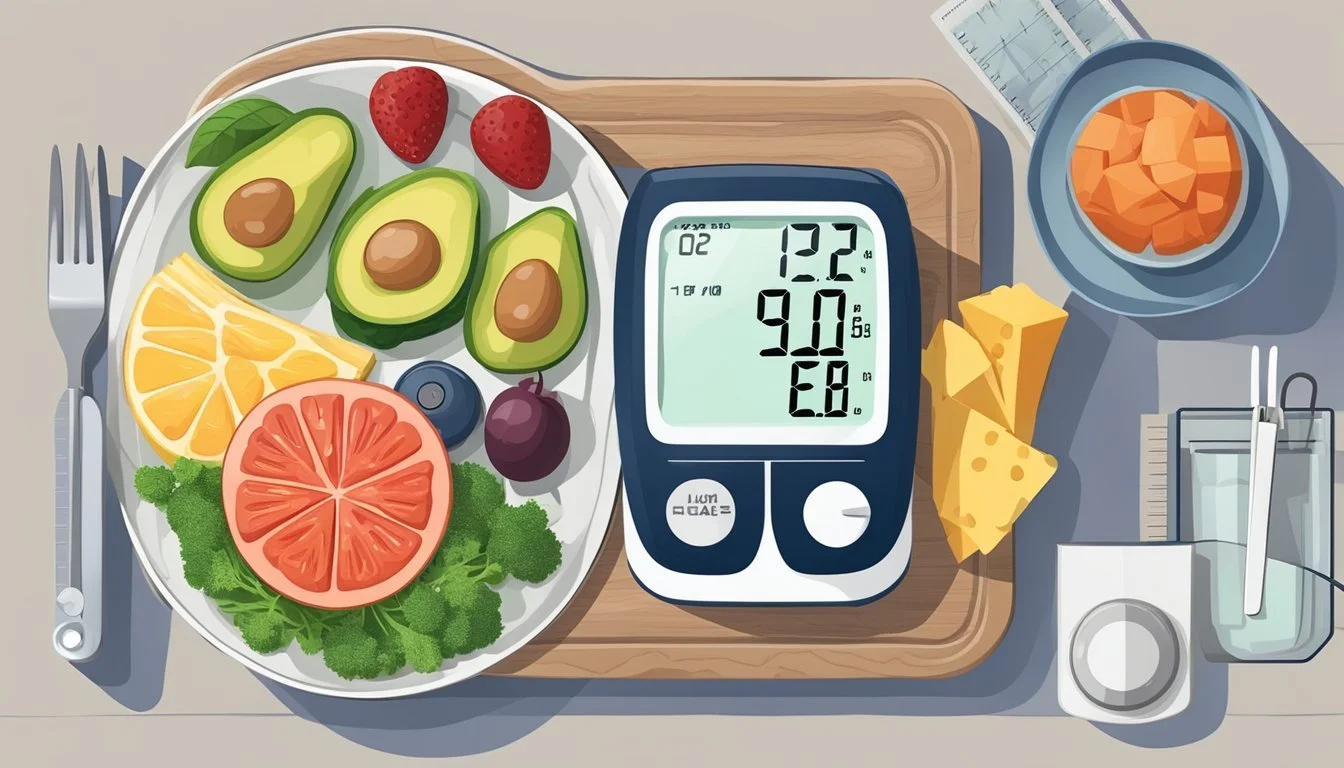Keto Diet and Metabolic Syndrome
Understanding the Connection
The ketogenic diet, commonly referred to as keto, is a low-carbohydrate, high-fat eating plan that has gained attention as a potential remedy for various health concerns, including metabolic syndrome. This dietary approach aims to induce a state of nutritional ketosis, where the body switches from burning glucose as its primary fuel to burning fat, producing ketone bodies as an alternative energy source. Proponents of the diet suggest that this metabolic shift can lead to weight loss, improved insulin sensitivity, and a reduction in the risk factors associated with metabolic syndrome, a cluster of conditions that can include elevated blood pressure, high blood sugar, excess body fat around the waist, and abnormal cholesterol or triglyceride levels.
While weight loss can be a significant advantage of the keto diet, its effects on metabolic syndrome are of particular interest due to the syndrome's association with an increased risk of heart disease, stroke, and Type 2 diabetes. Some research points to the potential benefits of the diet in mitigating inflammation and regulating metabolic functions, which can be beneficial to individuals grappling with metabolic syndrome. However, the dietary pattern's efficacy and safety continue to be debated within the scientific community, with some studies acknowledging its benefits and others highlighting potential risks and controversies.
Understanding and managing metabolic syndrome is crucial given its rising prevalence and serious health implications. The ketogenic diet's role in this domain warrants a closer discussion to discern its impact and applicability. As research on the diet's long-term effects continues, it is essential for individuals considering the keto diet for managing metabolic syndrome to consult healthcare professionals and consider any dietary changes in the context of their overall health and lifestyle.
Defining Metabolic Syndrome
Metabolic Syndrome (MetS) encompasses a constellation of metabolic disorders that increase the risk of developing cardiovascular diseases and Type 2 Diabetes. Understanding its criteria and the factors that exacerbate its prevalence is vital for diagnosis and management.
Criteria and Diagnosis
Metabolic Syndrome is diagnosed when three or more of the following criteria are met:
Central Obesity: Waist circumference exceeding 102 cm in men and 88 cm in women.
Dyslipidemia: Triglycerides levels of 150 mg/dL or higher, or drug treatment for elevated triglycerides.
Reduced HDL Cholesterol: Levels less than 40 mg/dL in men and less than 50 mg/dL in women, or drug treatment for reduced HDL cholesterol.
Elevated Blood Pressure: Systolic BP of 130 mmHg or higher, diastolic BP of 85 mmHg or higher, or treatment for hypertension.
Elevated Fasting Glucose: Blood sugar levels of 100 mg/dL or higher, or drug treatment for elevated blood sugar.
Prevalence and Risk Factors
The prevalence of Metabolic Syndrome is influenced by a range of risk factors. Foremost among these are:
Obesity: Particularly central adiposity, which is strongly associated with insulin resistance and dyslipidemia.
Insulin Resistance: A condition where cells fail to respond to insulin effectively, frequently leading to elevated blood sugar levels.
Genetics and Lifestyle: Genetic predisposition combined with lifestyle factors such as poor diet and sedentary habits increase the risk of MetS.
Age: The likelihood of developing MetS increases with age.
While these factors play a significant role, early intervention and treatment can manage or reduce the risks associated with Metabolic Syndrome.
The Ketogenic Diet Explained
The ketogenic diet is a high-fat, low-carbohydrate eating plan designed to trigger a metabolic state known as ketosis, where the body burns fat for energy.
Principles of Ketosis
Ketosis is a natural metabolic state in which the body uses ketones for fuel instead of glucose, which is derived from carbohydrates. When carbohydrate intake is drastically reduced, glucose reserves decrease, prompting the liver to convert fats into ketones. These ketones then become the primary energy source for the body and brain.
Nutritional ketosis is achieved through a diet consisting primarily of fats, with moderate protein intake and very limited carbohydrates.
This switch in metabolism aims to improve various health markers and has been associated with weight loss and better management of metabolic syndrome.
Macronutrient Distribution
The ideal macronutrient distribution in a ketogenic diet generally consists of:
Fats: 70-80% of total daily calories
Protein: 20-25%
Carbohydrates: 5-10%
Macronutrient Percentage of Daily Caloric Intake Fats 70-80% Protein 20-25% Carbohydrates 5-10%
Fat becomes the main source of energy, replacing carbohydrates, and is essential to sustain nutritional ketosis.
Protein is consumed in moderation to maintain muscle mass without disrupting ketosis.
Carbohydrate restriction is crucial; exceeding the daily limit can hinder the body's ability to remain in ketosis.
Health Benefits of Ketogenic Diets
A ketogenic diet, high in fats and low in carbohydrates, prompts the body to enter a state of ketosis. In this metabolic state, the body efficiently burns fat for energy, which can confer several health benefits, particularly for individuals with metabolic syndrome.
Weight Loss and Obesity
Ketogenic diets are particularly noted for their effectiveness in promoting weight loss. By reducing carbohydrate intake, these diets lead to a natural reduction in appetite, helping individuals consume fewer calories without feeling hungry. The diet has been associated with significant reductions in abdominal obesity, leading to improved outcomes for individuals with a high waist circumference, a common indicator of metabolic health risks.
Insulin Sensitivity and Diabetes
Adherence to a ketogenic diet can enhance insulin sensitivity, which is crucial for managing type 2 diabetes. By lowering blood sugar levels and improving glycemic control, as indicated by reductions in Hemoglobin A1c (HbA1c) levels, the diet can be a valuable tool for diabetes management. Additionally, ketogenic diets have been associated with decreased levels of fasting insulin, aiding in metabolic health.
Cardiovascular Health
The impact of ketogenic diets on cardiovascular health can be seen through changes in lipid profiles, including both LDL cholesterol and HDL cholesterol. While there are discussions about the diet's effects on cholesterol levels, many individuals observe a decrease in triglycerides and an improvement in HDL cholesterol levels, helping to lessen cardiovascular risks.
Nonalcoholic Fatty Liver Disease
Nonalcoholic Fatty Liver Disease (NAFLD) can benefit from a ketogenic diet through potential improvements in liver enzymes, such as Aspartate Aminotransferase (AST) and Alanine Aminotransferase (ALT). These improvements suggest that a ketogenic diet could have a positive impact on liver fat metabolism and liver health.
Neurological Disorders
Beyond metabolic syndrome, ketogenic diets may have therapeutic benefits in neurological disorders, such as epilepsy. The diet's ability to induce ketosis helps to reduce the frequency of seizures in many patients, showing its potential in managing neurological conditions alongside traditional treatment approaches.
Keto Diet's Role in Treating Metabolic Syndrome
Emerging evidence suggests that the ketogenic diet may be beneficial in managing Metabolic Syndrome, characterized by dysregulated glucose and insulin levels, an unfavorable lipid profile, and increased cardiovascular risk.
Impact on Glucose and Insulin Levels
The ketogenic diet drastically reduces carbohydrate intake, which leads to lowered glucose levels and improved insulin sensitivity. Studies show a ketogenic diet promotes a state of nutritional ketosis where the body shifts from glucose to ketone bodies for energy, thereby stabilizing glucose levels and reducing the need for insulin.
Influences on Lipid Profile
Implementing a ketogenic diet has been associated with improvements in lipid profile markers. Specifically, there's a noted increase in high-density lipoprotein (HDL) and a decrease in low-density lipoprotein (LDL) and triglycerides. This adjustment may translate to a lower risk of cardiovascular events, a common complication of Metabolic Syndrome.
Long-Term Efficacy and Considerations
Adhering to a ketogenic diet for the long term requires careful consideration and monitoring to maintain nutritional balance and avoid any potential adverse effects. While short-term benefits are clear, research is ongoing to understand the long-term impacts on cardiovascular health and Metabolic Syndrome.
Keto Diet and Lifestyle Integration
Integrating the ketogenic diet into one's lifestyle involves thoughtful planning and consideration of various factors to ensure it is sustainable and beneficial.
Daily Meal Planning
When adapting to a ketogenic diet, individuals should focus on a meal plan that limits carbohydrates to typically 20 to 50 grams per day, ensuring that fat sources are high-quality like avocados, nuts, seeds, and olive oil. Planning meals ahead can help maintain the required balance of macronutrients necessary to sustain ketosis, a state where the body burns fat for fuel.
Breakfast options might include eggs with spinach and avocado.
Lunch could feature a salad with grilled chicken, olive oil, and nuts.
Dinner may consist of fish or tofu with asparagus and a butter drizzle.
Physical Activity Considerations
Incorporating exercise into a lifestyle with a ketogenic diet is vital for overall health. Exercise can be maintained; however, the intensity may need to be adjusted as the body adapts to using fat for energy. Low to moderate-intensity activities, such as walking or cycling, are typically more manageable when beginning a ketogenic diet.
Strength training is also beneficial as it helps maintain muscle mass during weight loss. Individuals should monitor their response to exercise and adjust their electrolyte intake accordingly to maintain energy levels.
Behavioral and Psychological Aspects
Adopting a ketogenic diet requires a significant lifestyle shift, which can include behavioral and psychological challenges. It's imperative for individuals to cultivate a supportive environment, whether with friends, family, or online communities, to share experiences and encourage consistency.
It is also recommended to:
Set realistic expectations and goals.
Keep a daily food diary for accountability.
Seek professional guidance, if needed, to navigate the psychological adjustment to a new way of eating and to ensure the meal plan adheres to nutritional adequacy.
Nutritional Considerations and Challenges
When adopting a ketogenic diet for managing Metabolic Syndrome, ensuring nutritional adequacy is essential. It is a diet that requires careful planning to meet all dietary needs and avoid common deficiencies.
Ensuring Adequate Nutrition
A ketogenic diet limits carbohydrate intake significantly, which may lead to potential nutrient deficits if not properly managed. Individuals must focus on incorporating a variety of nutrient-dense foods to ensure they meet their daily macronutrient and micronutrient requirements. A balanced keto meal plan should include:
Fiber: Leafy greens and non-starchy vegetables
Proteins: Fish, lean meats, and eggs for amino acids and healthy fats
Fats: Sources like avocados, olive oil, and nuts
Addressing Common Deficiencies
Due to the restrictive nature of the ketogenic diet, certain nutrient deficiencies can occur. Common deficiencies include:
Electrolytes: Sodium, potassium, and magnesium levels can drop, so supplementation or consumption of electrolyte-rich foods is crucial.
Minerals: Calcium and phosphorus are required for bone health; low-carb dairy, fatty fish, and nuts can be good sources.
It's important to monitor micronutrient intake and consider supplementation under the guidance of a healthcare professional.
Keto-Friendly Foods and Alternatives
To maintain nutritional balance on a keto diet, one should consume:
Vegetables: Broccoli, cauliflower, zucchini, and spinach.
Fish: Especially fatty fish like salmon and mackerel, which are rich in omega-3 fatty acids.
Nuts: Almonds and walnuts, in moderation, provide essential nutrients and fats.
Fruits: Although most fruits are restricted, small portions of berries are allowed.
By focusing on whole, unprocessed foods and avoiding overly restrictive meal plans, individuals can meet their dietary needs while still adhering to the principles of the ketogenic diet.
Potential Side Effects and How to Mitigate Them
Adopting a ketogenic diet can result in a range of side effects, predominantly during the initial phase of the diet. Recognizing and managing these effects is crucial for individuals looking to maintain this dietary regimen for managing metabolic syndrome.
Short-Term Side Effects
Headaches and Fatigue: In the early stages of the ketogenic diet, individuals may experience headaches and fatigue due to a decrease in carbohydrate intake.
Mitigation: These can often be mitigated by ensuring adequate hydration and proper intake of electrolytes such as sodium, potassium, and magnesium.
Digestive Complaints: Constipation or diarrhea may occur as the body adapts to a higher fat intake.
Mitigation: Consuming enough fiber through low-carb vegetables and possibly supplementing with magnesium can help alleviate these symptoms.
Leg Cramps: A common short-term side effect of a ketogenic diet, often due to low levels of electrolytes.
Mitigation: Maintaining electrolyte balance through supplementation or consumption of electrolyte-rich foods is an effective strategy.
Long-Term Health Implications
Cholesterol Levels: Some people on a ketogenic diet may experience elevated cholesterol levels, which could impact heart health over time.
Mitigation: Monitoring cholesterol levels through regular blood tests and opting for healthier unsaturated fats instead of saturated fats could help manage this risk.
Comparison with Other Diets
When exploring dietary options for managing metabolic syndrome, two common alternatives to the ketogenic diet are the Mediterranean diet and various low-carb, as well as low-fat diets. Each has distinctive characteristics and impacts on health.
Mediterranean Diet Versus Keto
The Mediterranean diet is rich in unsaturated fats, primarily from olive oil, and emphasizes fruits, vegetables, whole grains, legumes, fish, and moderate red wine consumption. Contrastingly, the ketogenic diet is a high-fat, low-carbohydrate diet that significantly reduces carbs to typically less than 50 grams per day, leading the body to enter a state of ketosis.
Fat Intake: The ketogenic diet consists mainly of high-fat foods including butter and cream, whereas the Mediterranean diet is centered around unsaturated fats, with olive oil as a staple fat source.
Carbohydrate Intake: The Mediterranean diet includes moderate amounts of carbs through fruits, vegetables, and whole grains, unlike the ketogenic diet which severely restricts these food groups.
Low-Carb and Low-Fat Diets
Low-carb diets share similarities with the ketogenic diet in that they reduce carbohydrate intake, but the reduction is typically less drastic, allowing for a greater range of carbohydrate-containing foods. Low-fat diets focus on reducing the intake of fats, particularly saturated fats, and emphasize eating lean proteins, whole grains, and a variety of fruits and vegetables.
Overall Fat and Carbohydrate Balance:
Ketogenic Diet: High in fats, very low in carbs.
Low-Carb Diet: Moderate to high in fats, lower in carbs than a typical diet but not as low as keto.
Low-Fat Diet: Low in fats, typically higher in carbs, with a focus on whole grains rather than refined carbohydrates.
When comparing these diets, it's important to consider individual health goals, dietary preferences, and the ability to sustain the diet over time. Each diet has unique advantages, and the choice may depend on personal health conditions and lifestyle.
The Science Behind Keto Diet and Metabolic Syndrome
Ketogenic dieting induces significant physiological adaptations that may positively affect metabolic syndrome components. It alters the body's energy metabolism and has an impact on hormonal balance.
Metabolic Changes and Adaptations
A ketogenic diet, typically high in fats and low in carbohydrates, prompts the body to shift from relying on glucose for energy to burning stored fat, leading to a metabolic state known as ketosis. During this process, the liver produces ketone bodies, which serve as an alternative energy source, particularly for the brain. This metabolic switch can influence the pathophysiology of metabolic syndrome by:
Improving insulin sensitivity, which is crucial in metabolic syndrome where insulin resistance is a common issue.
Modulating lipid metabolism, often leading to a reduction in triglyceride levels and an increase in high-density lipoprotein (HDL) cholesterol, both beneficial for cardiovascular health.
Hormonal Responses to Ketogenic Eating
The ketogenic diet's influence on hormonal responses is multifaceted:
Insulin secretion typically declines due to lowered glucose levels, reducing the hyperinsulinemic state often associated with metabolic syndrome.
The diet can prompt hormonal changes that enhance satiety and suppress hunger, which may involve hormones like ghrelin and leptin. This, in turn, may aid in weight management, a key factor in combating metabolic syndrome.
Research and Clinical Trials
The body of research surrounding the ketogenic diet in the context of metabolic syndrome is robust, stemming from systematic reviews, meta-analyses, and a multitude of clinical trials. These studies provide a rigorous assessment of the diet's efficacy and safety, reflecting a growing interest in evidence-based approaches to managing metabolic conditions.
Systematic Reviews and Meta-Analyses
Systematic reviews and meta-analyses serve as cornerstones in synthesizing data from numerous studies to ascertain the effects of the ketogenic diet on metabolic syndrome. Recent systematic reviews have concluded that a ketogenic diet can significantly impact weight loss, Body Mass Index (BMI), glucose levels, and insulin sensitivity. For instance, one review found that in 19 analyzed articles, ketogenic diets were linked to weight reduction in 17 instances. BMI improvements were observed across all seven pertinent studies. Further, better glucose levels and insulin responses were noted in the majority of the related research, underscoring the potential benefits of this dietary approach for metabolic syndrome management.
Ongoing Studies and Future Research
Research continues with ongoing clinical trials exploring the ketogenic diet's role in treating metabolic syndrome and related illnesses. These studies seek to refine our understanding of the effectiveness, safety, and long-term sustainability of the diet. Ongoing research also aims to elucidate the mechanisms by which ketogenic diets can alleviate components of metabolic syndrome, such as dyslipidemia and hypertension. The knowledge gleaned from these future studies holds the promise of optimizing dietary strategies to combat the rising prevalence of metabolic disorders. The expectation is that these trials will not only solidify the current understanding of the ketogenic diet's benefits but also offer nuanced insights into its application across diverse populations and metabolic conditions.
Conclusion
Research indicates that a ketogenic diet can be a beneficial intervention for managing metabolic syndrome. This low-carbohydrate, high-fat diet aids in reducing obesity by promoting weight loss and decreasing hunger while increasing satiety. Beyond its impact on weight, the ketogenic diet has been shown to improve glycemic control and lipid profiles, particularly beneficial for individuals with prediabetes or diabetes.
Metabolic syndrome, characterized by a cluster of conditions including high blood pressure, high blood sugar, excess body fat around the waist, and abnormal cholesterol levels, increases the risk of heart disease, stroke, and type 2 diabetes. Lifestyle changes are essential for the management of metabolic syndrome, and the ketogenic diet is a lifestyle strategy that has received attention for its potential benefits.
The diet's capacity to induce nutritional ketosis alters the body's metabolism, utilizing fat for energy, which may contribute to the improved health outcomes observed in studies. It is evident that the ketogenic diet can be an effective part of a broader lifestyle modification plan.
However, long-term adherence to the ketogenic diet and its applicability to different individuals may vary. Tailoring the diet to individual needs and preferences is crucial for long-term success and enhanced health benefits.
Healthcare professionals should consider the ketogenic diet as one of the various dietary approaches for managing metabolic syndrome but also weigh its suitability for each patient. Monitoring and guidance by a healthcare provider are recommended to ensure nutrient adequacy and to mitigate potential risks associated with substantial dietary changes.






